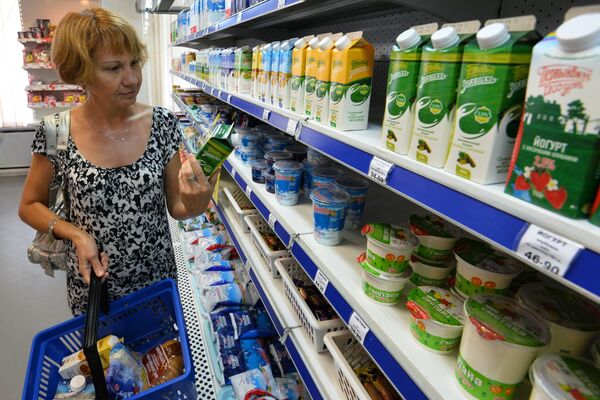MOSCOW, September 1 (RIA Novosti) - Deputy Head of A Just Russia party in the State Duma Oleg Nilov has prepared a draft law for the protection of Russian food producers, stipulating that at least 50 percent of the products in retail chains must be produced in Russia, the newspaper Izvestiya wrote Monday.
The bill amends the Article 8 of the Federal Law "On the Principles of State Regulation of Trade in the Russian Federation" and the Tax Code.
"The document will still be specified in order to avoid putting the buyers to trouble. This concerns the goods that are not produced in Russia... As for the other groups of products that are produced in Russia, a retailer will have to provide at least half of their shelves to domestic producers," the newspaper reported, citing the Russian lawmaker.
At the same time, the bill amends the Tax Code of the Russian Federation establishing a reduced VAT rate of 10 percent if all food products from Russia are sold.
"The law is intended to oblige retailers to reckon with domestic producers while picking orders. Then the import substitution process will go smooth and steady, and the system of production planning on essential produce will be created in no time," the lawmaker was quoted as saying.
On August 7, Moscow imposed a ban on food imports from the United States, the European Union, Canada, Australia and Norway in response to economic sanctions imposed on Russia over its alleged role in escalating the Ukrainian crisis.
The ban, targeting meat, fish, poultry and milk products, nuts, fruits and vegetables, is expected to last for a year. Russian Deputy Prime Minister Akady Dvorkovich said the embargo would be lifted when Moscow sees that its national security is no longer threatened.
The Amsterdam-based ING group estimated earlier this month that Russian food restrictions could cost the European Union $9 billion annually and up to 130,000 jobs.
In Russia, European food products are being substituted by local agricultural production. Latin American countries Ecuador, Mexico, Brazil and Argentina among others, have expressed their willingness to boost food exports to Russia.



